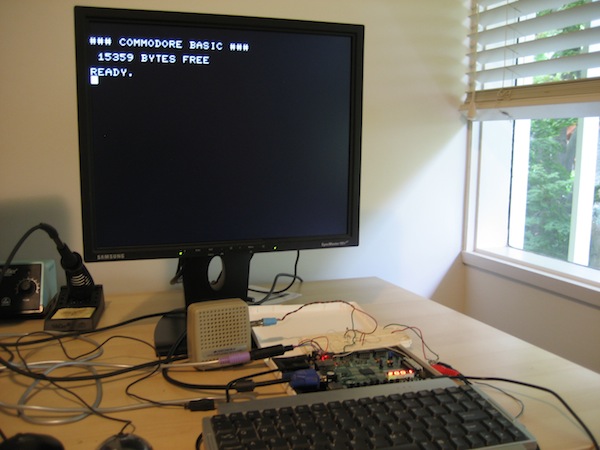USB/Ps2 Combo will work with other Cores this is not a Problem.
Have contacted Autor but no Answer, need help with the Rom Memory
Must seperate the CharRom, Screen shows only Garbage with 2-Port-Ram
Original Code
Code: module pet2001roms(
output [7:0] data, // cpu interface
input [13:0] addr,
output [7:0] chardata, // video interface
input [10:0] charaddr,
input clk
);
// Arrange as 8 16x1 two-port RAMs
genvar x;
generate
for (x=0; x<8; x=x+1) begin:bits
RAMB16_S1_S1 rom(.DIA(1'b0),
.DOA(data[x]),
.ADDRA(addr),
.WEA(1'b0),
.ENA(1'b1),
.SSRA(1'b0),
.CLKA(~clk), // see description
.DIB(1'b0),
.DOB(chardata[x]),
.ADDRB({3'b101,charaddr}),
.WEB(1'b0),
.ENB(1'b1),
.SSRB(1'b0),
.CLKB(~clk) // see description
);
end
endgenerate
endmodule // pet2001roms
have try this
Code: pet2001roms1 rom(
.address_a(addr[13:0]),
.address_b(charaddr),
.q_a(rom_data),
.q_b(chardata),
.enable_a(1'b1),
.enable_b(1'b1),
.clock_a(~clk),
.clock_b(~clk)
);
think problem is in Megafunctions must have address_a and address_b the same Size
My "working Solution"
Code: pet2001romfull rom(
.q_a(rom_data),
.address_a(addr[13:0]),
.address_b(),
.q_b(),
.enable_a(1'b1),
.enable_b(),
.clock_a(~clk),
.clock_b());
//Need to seperate it no Chars without
Charrom rom2(
.address(charaddr),
.q(chardata),
.clock(~clk)
);
|

